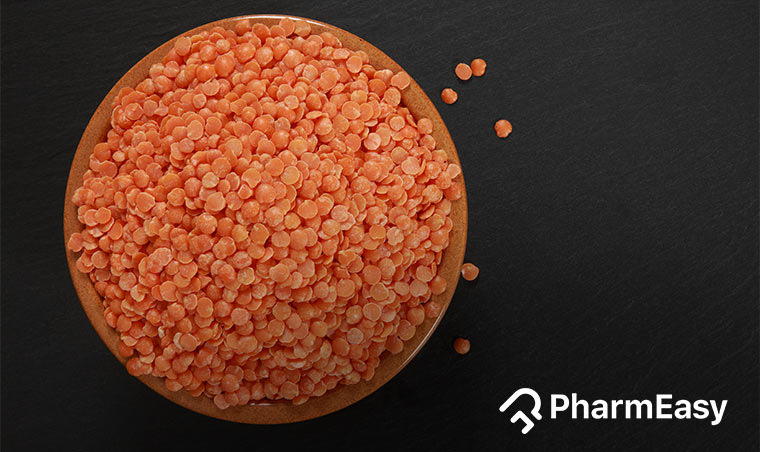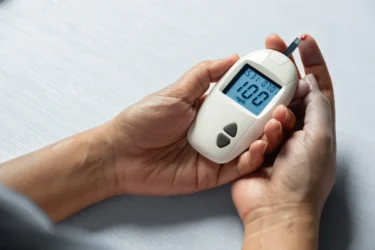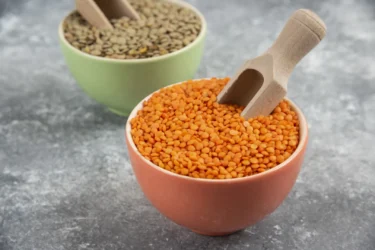Masoor Dal: Uses, Benefits, Nutritional Value & more!
By Dr. Malavika Athavale +2 more

Get,

to manage your symptom
Get your,


4 Cr+ families
benefitted

OTP sent to 9988776655



You’ve successfully subscribed to receive
doctor-approved tips on
Whatsapp

Get ready to feel your best.

Hi There,
Download the PharmEasy App now!!


Register to Avail the Offer
Send OTPBy continuing, you agree with our Privacy Policy and Terms and Conditions

Hi There,
Sign up on PharmEasy now!!
Trusted by 4 crore+ families

OTP sent to 9988776655



You have unlocked 25% off on medicines




Code: NU25
By Dr. Malavika Athavale +2 more
Table of Contents
Masoor dal (Lens culinaris), also called red lentil, is a staple food in every Indian household. It is widely cultivated in warm, tropical, and temperate zones for its edible and nutritious seeds. In addition, it is an important source of protein for the vegetarian population in developing countries. Masoor dal is red in colour; it is a split whole masoor and does not have any skin. The whole masoor is brown in colour1.

Masoor dal is a good source of carbohydrates, proteins, fibers, vitamins, and other micronutrients1. Masoor dal is rich in macronutrients, micronutrients, and bioactive components. The nutritional value of slip masoor dal is given below2.
Nutritional value of masoor dal (micronutrients) per 100 grams has bioactive phytochemicals like flavonoids, catechin, stigmasterol, campesterol, β-sitosterol, and tannins3.
Masoor dal has been traditionally used in some cultures for skin care, such as applying it as a paste for general skin support or soothing minor irritations. In some traditional practices, roasted and milled masoor dal has also been used for minor skin discomforts. However, there is currently insufficient scientific evidence to support these uses. These traditional applications should not be considered a substitute for medical treatment3.
Dr. Siddharth Gupta, B.A.M.S, M.D (Ayu)
Masoor dal offers many health benefits, the components of masoor dal may be responsible for these beneficial effects, these beneficial properties are listed below5.
The presence of a vast majority of nutrients and phytochemicals in masoor dal may be beneficial to health. Its content of vitamins, fibres, and flavonoids is associated with several potential uses, as outlined below.

High content of fibres and carbohydrates found in masoor dal can benefit people trying to manage their blood sugar levels. Including lentils in the diet may help individuals with type 2 diabetes as it helps in the management of diabetes. It is also recommended in the diet of the general population to prevent diabetes4.

Consumption of lentils is associated with a reduced risk of obesity. The high fibre content of lentils gives the feeling of fullness sooner, reducing food intake and potentially controlling body weight. You must consult a nutritionist for advice before changing or adding anything to your diet5.

The high protein content in masoor dal can help individuals who want to improve their protein intake. Make sure to consult a doctor before adding it to your diet to know if it is right for your situation3,6.

Consumption of masoor may also be beneficial for cardiovascular health. Pulse consumption may have some effects on the incidence of cardiovascular diseases, including hypertension, by having potential effects on serum cholesterol levels. These activities, however, are yet to be proven in humans. Moreover, cardiovascular conditions must be properly diagnosed and treated by a specialist doctor. Therefore, kindly ensure to consult a doctor3,5.

Consumption of masoor dal might also be associated with a positive effect on breast cancer in people. Plant lectins found in masoor dal have potent biological activity. They may have anticancer activity. The protease inhibitors found in masoor dal may also have cancer-preventing properties. There is a need for more extensive research to validate the effect of masoor dal in humans. It is important to note that cancer must be diagnosed and treated by a qualified medical professional. Therefore, always consult a doctor for appropriate diagnosis and treatment.
Although studies show the benefits of masoor dal in different health conditions, this information is insufficient. Hence, there is a need for further studies to establish the true extent of the benefits of masoor dal on human health. Furthermore, every person may respond differently to these herbs. Therefore, it is important to consult a doctor before using masoor dal for any medical condition3.
Masoor dal is rich in proteins, which makes them incredibly valuable to our diet. In fact, their protein content is closely similar to that of animal proteins, giving them a high food value.This protein can be easily digested, and do not cause harmful uric acid accumulation in our bodies8.
Dr. Smita Barode, B.A.M.S, M.S.
Masoor dal can be eaten as whole masoor dal as well as split masoor dal. Before preparation, the masoor dal is checked for any stones or foreign matter, and then they are rinsed with water till the water comes out clear. Masoor dal is then boiled to a stew-like consistency with vegetables and then seasoned with a mixture of spices to make dal, which is usually served with rice and roti2.
You must consult a qualified doctor before taking any herbal supplements. Do not discontinue or replace an ongoing treatment of modern medicine with an ayurvedic/herbal preparation without consulting a qualified doctor.
Also Read: Chayote: Uses, Benefits, Side Effects & More
Overconsumption of masoor dal may lead to digestive discomfort, including intestinal gas, abdominal bloating, and cramping. As it is high in dietary fibre, it is advisable to increase its intake gradually to allow the body to adjust. Additionally, drinking sufficient water can help the fibre move smoothly through the gastrointestinal tract, reducing the likelihood of discomfort7.
If you experience any side effects from consuming masoor dal, consult a doctor immediately.
Masoor dal contains compounds known as lectins, which may have potential in supporting the body’s defence against retroviral infections such as HIV3. However, more research is needed to confirm these effects in humans.
Dr. Rajeev Singh, BAMS
There is a lack of sufficient data regarding the interaction of masoor dal with any other drugs. Therefore, consult a doctor before taking it, especially if you are on medication or are receiving treatment for any condition.
Also Read: 12 Nutritional Benefits Of Bajra (Pearl Millets)
Masoor dal is a nutritious legume that may offer various health benefits due to its rich content of proteins, fibres, and bioactive compounds. However, further research is needed, and it should be consumed as part of a balanced diet under proper guidance.
Also Read: Urad Dal: Uses, Benefits, Side Effects, and More!
Masoor dal is a good protein source. It is also good for the heart and can help in obesity.
The dietary requirement for fibre depends on many factors such as gender and age.
Masoor dal is generally considered safe for individuals with diabetes, as its high fibre content may help in managing blood glucose levels. It is often recommended as part of a balanced diet for those with type 2 diabetes. However, scientific studies on the specific benefits of masoor dal in humans are currently limited. Therefore, it is essential to consult a qualified healthcare provider for proper diagnosis and treatment before using masoor dal for managing diabetic conditions. It is not advisable to use masoor dal or any other herb as a substitute for prescribed medical treatment without professional guidance.
Avoid depending on one food for your fibre intake. Try to incorporate two more foods to make up for your daily fibre requirement. Including fruits and vegetables would be a good choice. One hundred grams of masoor dal (split masoor) has 4.3 grams of fibre.
After six months of exclusive breastfeeding, babies can start eating solid foods. Cooked masoor dal would be a good source of fibre, vitamins, and minerals for the baby. Consult a doctor before adding masoor dal to a baby’s diet.
Disclaimer: The information provided here is for educational/awareness purposes only and is not intended to be a substitute for medical treatment by a healthcare professional and should not be relied upon to diagnose or treat any medical condition. The reader should consult a registered medical practitioner to determine the appropriateness of the information and before consuming any medication. PharmEasy does not provide any guarantee or warranty (express or implied) regarding the accuracy, adequacy, completeness, legality, reliability or usefulness of the information; and disclaims any liability arising thereof.
Comments

Leave your comment...
You may also like
Comments